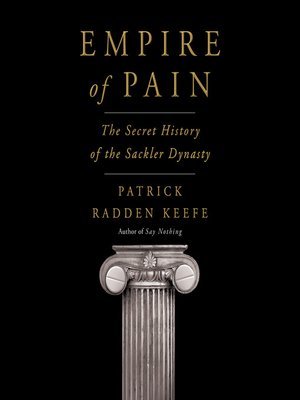

“Those people had to take the fall to protect the family,” Baker said, as quoted in Empire of Pain, Patrick Radden Keefe’s masterfully damning new book about that family, the billionaire Sacklers, who owned Purdue. Those three men had pleaded guilty in 2007 to making fraudulent claims about the harmlessness of Purdue’s cash cow product, Ox圜ontin, and had been forced to resign. At a meeting, the company’s lawyer, Stuart Baker, had been praising three former members of the leadership team, including his own predecessor. In the late 2000s, an employee of Purdue Pharma was stunned by the words of the corporation’s in-house counsel. It was a tiny company, but it had a good, patrician name: Purdue Frederick.Slate has relationships with various online retailers.īut note that deals can expire and all prices are subject to change.Īll prices were up to date at the time of publication.

Then in 1952, Arthur decided to purchase a pharmaceutical company for his kid brothers. The three of them would eventually start a research center there that explored drug treatment options that could replace shock therapy and lobotomies, which were standard practices at the time. He would get them both jobs at the psychiatric hospital (where he continued to work). Still, Arthur couldn’t stop thinking of them as his kid brothers.

Mortimer and Raymond would also become doctors. For years it was the most prescribed drug in America. His advertising campaigns for Valium, a minor tranquilizer produced by the company Roche, focused on convincing physicians to prescribe it for just about any ailment, major or minor. One drug in particular helped make Arthur rich. Over his career, Arthur would transform pharmaceutical advertising–colleagues claimed he really invented the wheel. He also enlisted prominent doctors, and sometimes fake ones, to sell his products. He placed them in medical journals, and sent literature to doctors’ offices. He was named President after just two years, and eventually bought the firm.īeing a doctor himself, Arthur’s ad campaigns appealed directly to physicians. He then enrolled in medical school at NYU and took a full course load while maintaining extracurriculars and several jobs.Īfter med school, Arthur would work all day at a state psychiatric hospital, and then spend evenings and weekends working for a medical advertising agency, called William McAdams. He kept it up in college, too, graduating in the middle of the Great Depression with enough money to buy his parents a grocery store in Brooklyn. He had so many side gigs that he had to give some over to his younger brothers, Mortimer and Raymond. In high school he worked for the school paper where he sold ads on commission. From a young age, Arthur Sackler was a hustler.


 0 kommentar(er)
0 kommentar(er)
